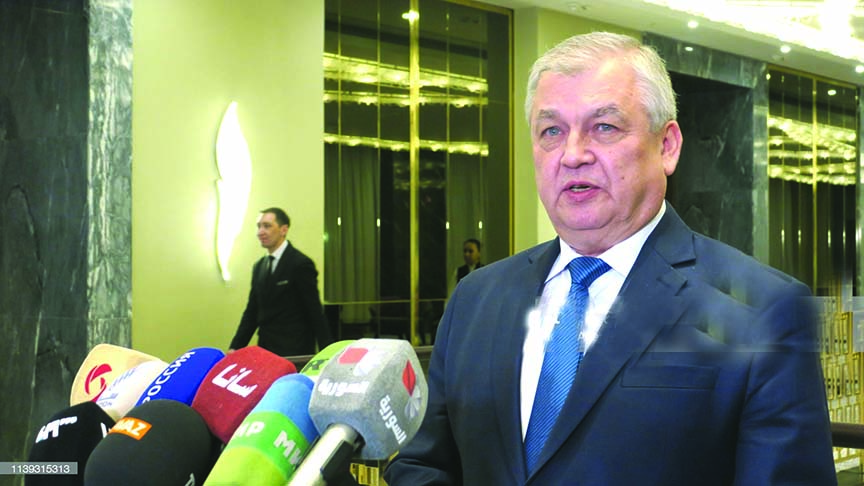
AP, Ceylanpinar, Turkey :
Russia will not allow clashes between Syrian and Turkish forces, Russian president’s special envoy on Syria Alexander Lavrentiev said on Tuesday.
Speaking to the press in Abu Dhabi, amid President Putin’s visit to the UAE, he also stressed that Moscow viewed the Turkish offensive in Syria as unacceptable, adding that Russia has always urged more restraint from Turkey in Syria.
“The safety of the border between Turkey and Syria must be provided for through deployment of government forces along its full length,” he said.
Earlier in the day, Russia’s Defense Ministry said the Russian military police were patrolling the area between Syrian and Turkish forces in the city of Manbij.
It also said that the Syrian army was in full control in Manbij and settlements in its vicinity.
Previously, Turkey’s President Erdogan said that Manbij was a key target for the Turkish forces in Syria as they pushed on the Kurdish-led fighters in an intense offensive.
The statement came as the Kurdish forces apparently reached a deal with Damascus, with the Syrian army scrambling to deploy in the operation area.
A Russian envoy for Syria says that Moscow will not allow Turkish and Syrian government forces to clash, underscoring his country’s role as de facto power broker in the conflict amid a U.S. pullout.
Alexander Lavrentyev, presidential envoy for Syria, told Russian state news agencies on Tuesday that “no one is interested” in potential fighting between Syrian government troops and Turkish forces that entered Syria last week. Lavrentyev said Russia “is not going to allow it.”
Lavrentyev also denied reports saying that Moscow has given the green light to Turkey’s operation in Syria and insisted that Russia “has always thought that any military operation in Syria is unacceptable.”
Lavrentyev confirmed that Kurdish leaders and representatives of the Syrian government held talks at a Russian military base last week but said that he was not aware of any results.
Reuters adds: The Kremlin complained on Monday that Turkey’s incursion into northern Syria was “not exactly” compatible with Syrian territorial integrity, and Ankara should ensure its actions were proportionate. The Kremlin was commenting as Russia-backed Syrian forces deployed deep inside Kurdish-held territory south of the Turkish frontier, less than 24 hours after Washington announced a full withdrawal.
Washington’s Kurdish former allies said they invited in the government troops as an emergency step to help fend off an assault by Turkey, launched last week after President Donald Trump moved his troops aside in what the Kurds call a betrayal.
The move was a major boost for Syrian President Bashar al-Assad, Russia’s closest Middle East ally, offering him an opportunity to retake territory in the world’s deadliest current war.
But it also makes Moscow’s balancing act in the eight-year-old conflict war more delicate, as it will put Syrian government troops, who are backed by Russian air power, in close proximity to the Turkish army and its proxies.
That raises the risk of a clash between two Russian allies and of Moscow’s own forces being sucked into some kind of incident with NATO member Turkey, to which it has drawn steadily closer diplomatically.
Russia’s Ministry of Defense said media reports sourced to Turkish officials that Moscow had no objections to Turkey including the town of Kobani in its operation were wrong.
“During talks with Turkish colleagues questions about extending Operation Peace Spring, the operation by Turkey’s armed forces, to the Syrian town of Kobani were not discussed,” it said.
The ministry did not identify the Turkish officials, but President Tayyip Erdogan said on Sunday that Turkey’s incursion would stretch from Kobani in the west to Hasaka in the east, going some 30 km (19 miles) into Syrian territory.
On Monday Erdogan said he did not think any problems would arise in Kobani, which had been held by the Kurdish-led Syrian Democratic Forces, after the Syrian army deployed along the border, adding that Russia’s Vladimir Putin had shown a “positive approach.”
Yuri Ushakov, a senior foreign policy adviser to Russian President Vladimir Putin, said Moscow wanted Turkey to ensure its military incursion into northern Syria was proportionate.
“The main thing is that the Turks act in a way that is proportionate with the situation and that their actions do not harm the most important thing – efforts to get a political settlement in Syria. That is the main thing for us,” said Ushakov.

